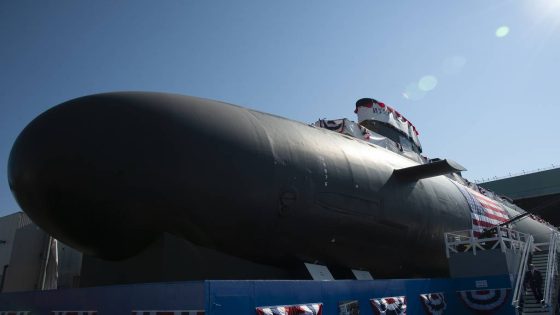The House Armed Services Committee will try to partially fund a second Virginia-class submarine in fiscal 2025 to mitigate harm to the industrial base it says will come from the Navyâs one-boat request.
The service has bought Virginia-class attack submarines at a rate of two per year since 2011. It has also pitched this continuous and predictable construction pace as key to getting back to on-time deliveries and increasing industrial base output to support the AUKUS agreement between Australia, the U.K. and the U.S.
However, the Navy asked for one boat in its FY25 budget request released in March.
âThe committee continues to be perplexed by the Navyâs inconsistent funding of shipbuilding and specifically that of Virginia class submarines. For the second time in less than 5 years, the Navy has surprised both Congress and industry by removing a submarine from the budget request that had previously been planned for inclusion,â according to a section of the FY25 defense authorization bill by the committeeâs sea power panel, released May 14.
âThis sporadic funding will only further stress an already stressed industrial base while also delaying the time it will take to reach the Navyâs stated goal of 66 fast attack submarines (SSNs),â the document added.
The Navy justified its decision to request a single Virginia sub by pointing to its inclusion of $3.9 billion for the submarine-industrial base as well as $2.4 billion in advance procurement to continue buying long-lead time materials for future boats and keep associated vendors busy.
But Rep. Joe Courtney of Connecticut, the top Democrat on the sea power subcommittee, has repeatedly stated the combination of submarine-industrial base funding and advance procurement efforts still doesnât cover the full breadth of contractors in the supply chain, meaning the Navyâs budget request could leave some companies without enough work in FY25. That, he has argued, could put them at risk of going out of business or laying off skilled workers.
As a result, the committee is putting $1 billion toward incrementally funding the second submarine, with the intention of following up with additional funds for that boat in other fiscal years.
A senior Democratic committee staffer told reporters the $1 billion in shipbuilding funds is a âdown paymentâ on the second boat, as the committee looked into what it would take to keep that submarine on its original schedule for delivery to the Navy.
âWeâve incrementally funded ships; we have a pretty long history and track record and are committed to doing that. And so itâs a matter of looking at: What are those long-lead items? What are we going to put into that second boat? And then come back next year to finish it out,â the staffer said.
The committee is limited in what it can add to the budget this year, as the Fiscal Responsibility Act outlines the toplines for defense and nondefense discretionary spending in FY24 and FY25.
Still, a senior majority committee staffer told reporters the committee didnât craft its spending plan by making cuts specifically in support of new additions â so, for example, while the committee cut $1.17 billion from the frigate program due to delays, that money isnât meant to be viewed as a one-for-one trade.
âChairman [Rep. Mike] Rogersâ direction to us was, build the best budget you can,â the staffer said, noting the committee looked at the spending plan holistically and balanced the servicesâ spending needs. Rogers is a Republican from Alabama.
Megan Eckstein is the naval warfare reporter at Defense News. She has covered military news since 2009, with a focus on U.S. Navy and Marine Corps operations, acquisition programs and budgets. She has reported from four geographic fleets and is happiest when sheâs filing stories from a ship. Megan is a University of Maryland alumna.
Source Agencies


